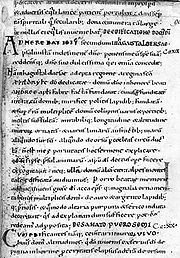Vita Sancti Wilfrithi
| Vita Sancti Wilfrithi | |
|---|---|
| "The Life of St. Wilfrid" | |

A page from an 11th-century manuscript of the Vita Sancti Wilfrithi describing the foundation of Hexham Abbey
|
|
| Author(s) | Stephen of Ripon |
| Language | medieval Latin |
| Date | composed between 709 and c. 720 |
| Manuscript(s) |
1. London, British Library, Cotton Vespasian D. vi. Provenance: probably transferred from Yorkshire before it was held in Canterbury and then acquired by the British Library.
|
| Genre | prose hagiography |
1. London, British Library, Cotton Vespasian D. vi. Provenance: probably transferred from Yorkshire before it was held in Canterbury and then acquired by the British Library.
The Vita Sancti Wilfrithi or Life of St Wilfrid (spelled "Wilfrid" in the modern era) is an early 8th-century hagiographic text recounting the life of the Northumbrian bishop, Wilfrid. Although a hagiography, it has few miracles, while its main concerns are with the politics of the Northumbrian church and the history of the monasteries of Ripon and Hexham. It is one of a collection of historical sources from the late 7th- and early 8th-centuries, along with the anonymous Vita Sancti Cuthberti, the works of Bede and Adomnán's Vita Sancti Columbae, that detail the Christianisation of Great Britain and make the period the best documented period in English history before the age of Alfred the Great.
In the preface to the Vita Wilfrithi, the author reveals that he is a priest called Stephen. Writers in modern times often style the author "Eddius Stephanus", an attribution that goes back to the 17th century. This attribution is now thought unlikely by many historians. The identification was made because the Vita Wilfrithi recounts that sometime between 666 and 669, Wilfrid brought two singing masters from Kent to Ripon, Ædde and Æona.
This Ædde was also mentioned by Bede, who says that an Æddi cognomento Stephanus ("Ædde, also known as Stephen") was brought to Northumbria by Wilfrid and was the first singing-master (cantor) among the Northumbrians. This is not however thought to be good evidence by many modern historians, while many other factors, such as age, make the attribution positively unlikely.
The Vita Wilfrithi can be dated reasonably securely between 709, the year of Wilfrid's death, and c. 720. The latter date, c. 720, is the approximate date of the Vita Sancti Cuthberti, a text which the Vita Wilfrithi quotes, and indeed imitates so often that one historian has used the word "plagiarism". There are some indications that it was written after 716.
...
Wikipedia
